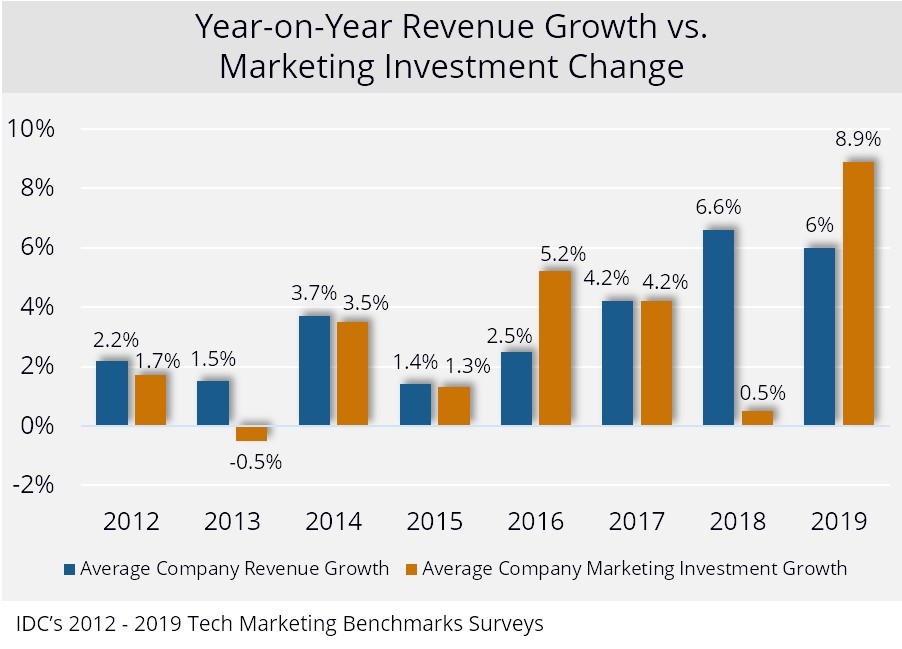IDC CMO Advisory Service has published results from its 17th annual Tech Marketing Investment Benchmark survey. Investment patterns provide evidence for marketing’s expanding role.
Technology buyers now use marketing-related information sources (digital and social) over sales at every stage of their decision-journey, according to IDC’s IT Buyer Experience survey. Even at the purchase stage, buyers use these information sources 69% more often than they turn to sales. It’s no longer enough to simply use digital to conduct traditional marketing better. IDC finds that marketing is shouldering pipeline building tasks that used to be in sales and moving into post-purchase realms to affect overall customer experience.
Key Finding: Marketing Gets a Budget Boost
Marketing budgets among the 54 technology companies surveyed increased by an average of 8.9% in 2019. Those same companies also expect a revenue increase of 6% for the same period. Tech marketing budgets have grown every year since 2014, but IDC finds that in 2019 marketers experienced one of the best growth years ever. Two-thirds of the companies in the survey grew budgets. In 2019, the average tech company’s marketing budget is 2.6% of revenue. However, this percentage varies by company size, sector, sales model, and growth and can be significantly larger.

Key Finding: Marketing Shoulders More Pipeline Tasks
Even as the digital transformation continues to send tsunamis through marketing, one key performance indicator remains consistent – a balance between awareness and demand activities. In 2019, tech companies invested 48% of their budget in awareness and 52% in demand. IDC published a document called Redefining Awareness Marketing for the Digital Age that refreshes the definitions of awareness and demand. Quoting marketing guru, Seth Godin, IDC believes that marketing has two jobs – turning strangers into friends (this is the job of awareness activities) and turning friends into customers (this is the job of demand activities).
However, beneath the placid surface of this stable KPI, the nature of how marketers build demand is changing significantly. The evolution of customers’ preference to engagement via digital requires companies to boost marketing’s pipeline building role. The IDC survey finds that marketing is getting a larger allocation of the sales-and-marketing cost envelope. Business development reps (BDRs), the non-quota-carrying team that nurture leads and set appointments, are increasingly moving into marketing.
Key Finding: Investment Moves into Post-Purchase
CMOs continue to shift more investment into activities that influence post-purchase customer behavior. Traditional focus for B2B marketing had been the very earliest stages of customer interaction, after marketing ceded actions to sales and service/support. Now, marketing is taking a broader role in expansion, retention and loyalty activities.
IDC added the new staff category of Loyalty and Advocacy to the taxonomy in 2016. This year, the definition was expanded to include customer marketing, which includes customer experience roles within marketing. Watch this category! It has already ballooned to nearly 3% of total marketing staff – more that marketing technology. In the 2019 survey, nearly a quarter of program investment focused on the post-purchase activities for those companies that can track investments by customer journey stages.
Essential Guidance
As marketing takes a more prominent role in tech companies, CMOs must escalate their operations to meet new requirements.
- Increase financial accountability: Inform your 2020 budget with benchmark data. The goal is not to copy – every company is unique. But be curious about where you make different decisions. Initiate discussions on short-term improvements and longer-term transformations that will be needed for scale, for new markets, or customer experience improvements.
- Invest in the next phase of MarTech: Which is more important – culture? technology? The answer is an “AND” not an “OR”. Regardless of how much MarTech you have, the maturity bar keeps rising. Technology will be needed to manage privacy and consent, for personalization, to collaborate, and to manage new channels such as conversational interfaces and augmented reality.
- Consider an agile approach: Within a complex context like marketing, success is substantially boosted by using methods that stress speed and responsiveness. Reduce dependency on top-down, waterfall planning and processes in favor of those that increase flexibility without sacrificing quality.
The executive summary of the IDC Tech Marketing 2019 Benchmark survey is available to all IDC clients. For information about obtaining the full survey report or a custom analysis comparing your company to a group of your peers, please contact your IDC account manager or Warren Lane wlane@idc.com.
From thought leadership to analytics, learn how to supercharge your marketing activities to produce relevant, high-quality content that converts. Explore IDC’s hub for more marketing insights that will help you maximize your tech marketing investment:




